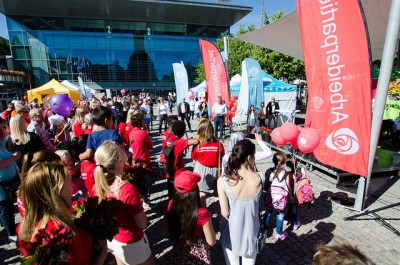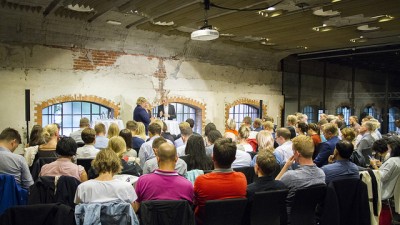NEWS ANALYSIS: Norway is currently awash in political campaigns, a month ahead of the local elections to be held nationwide on September 14. The actual balloting sets itself apart from other elections, though, because legal residents of Norway who are not Norwegian citizens are allowed to vote in this one.

The campaigns have shifted into high gear in recent days, as party leaders and other top politicians gathered once again in the southern coastal city of Arendal. More than 400 political events and 200 organizations have been fighting for attention and support, and it was all due to climax Monday night with the first of several live nationally televised debates among the leaders of all parties represented in Parliament. Prime Minister Erna Solberg and Labour Party leader Jonas Gahr Støre, who heads the opposition, would be among those seeking support for their candidates at the local government level, from Oslo to Ofoten.
The so-called kommunevalg in Norway, held over four years, is open to all residents of the kommuner (municipalities) from Sarpsborg in the south to Kirkenes in the far northeast. While national elections generally get the most attention abroad, it’s the local elections that are open to foreign residents and arguably mean the most for Norwegian residents. That’s because in Norway, it’s the local governments that administer schools, day care centers, nursing homes and a long list of social welfare services in addition to providing the basics like streets, sewers and garbage collection. The state hands over much of their funding, but it’s the local politicians who decide how it’s spent.
Rare opportunity to make foreign voices heard
The combination of important issues for everyday life and the ability to vote on who will settle them makes the municipal elections a rare outlet for non-citizens to make their voice heard. All residents, both Norwegian and foreign citizens, have been sent voting cards and in Norway, where voting is considered a civic duty and voter turnout is relatively high, they’re expected to be used. If you don’t bother to vote, it’s believed, you have less grounds for complaining about the result.
This year one of the biggest issues hanging over the local election process is reform of the kommuner themselves. Solberg’s conservative state government coalition is pushing for what’s called kommunereform, which involves merging municipalities so that they’ll be fewer and larger. Local politicians will decide whether they want to work together and merge with those across the city- or township line. A decision on whether some may be forced to merge if they don’t do so voluntarily will be made at the national level, but local voters can have a say now in whether they support reform-friendly candidates or those who want to maintain the 428 local government adminstrations that Norway has now. Reform advocates want to cut that to around 100.

Solberg’s Conservatives have been widely viewed as getting off to the best campaign start in this local election year. She started traveling around the country with campaign messages and promises even before the traditional summer holidays ended, and then one-upped Støre in a debate between the two after a week on the campaign trail. All the other, smaller parties were slower on the uptake, giving the Conservatives and Labour a headstart. Most commentators believe the Conservatives, with Solberg traveling around Lofoten by boat and helicopter, have performed better than Labour, which saw Støre riding the train to Lillehammer.
Taxes, schools and jobs have emerged as major issues, along with funding for elder care, with Labour openly supporting property tax as a means of maintaining key social services while the Conservatives are opposed in principle. The differences between the two major parties are harder to discern on funding for schools, with Labour campaigning for more teachers while the Conservatives want to make teachers more competent. Labour wants free school lunches, while the Conservatives want to use lunch money in other areas.
Polls indicate Labour recovering
After stumbling at the start, though, Labour jumped two-and-a-half points in the most recent public opinion poll to secure 35.4 percent of the vote, while the Conservatives rose only 0.3 of a point to 26.5 percent of the vote in the poll conducted by research firm Respons for newspaper Aftenposten. The Progress Party, which shares power with the Conservatives, fell as much as Labour gained, leaving it with just 9.3 percent of the vote.
There was little movement among all the other smaller parties. One of them, however, the Greens, has grown to command nearly as much of the vote as the Christian Democrats and Liberal parties (around 5 percent each). Commentators speculate that the Greens, running a campaign based on environmental- and climate-friendly proposals, may well grab votes away from other parties in the upcoming local elections, not least the Liberals and the Socialist Left Party (SV). SV, which shared state government power in the former Labour-led coalition, is now a shadow of its former self, with just 2.9 percent of the vote.
Newsinenglish.no will be carrying various articles over the next four weeks leading up to the election, covering the issues, various campaign promises and the mayors’ races in Norway’s biggest cities. Voting takes place September 13 and 14 but ballots can also be cast in advance, until September 11. For more information on how the election works, and how to vote, click here (external link to the state’s Election Portal).
newsinenglish.no/Nina Berglund

